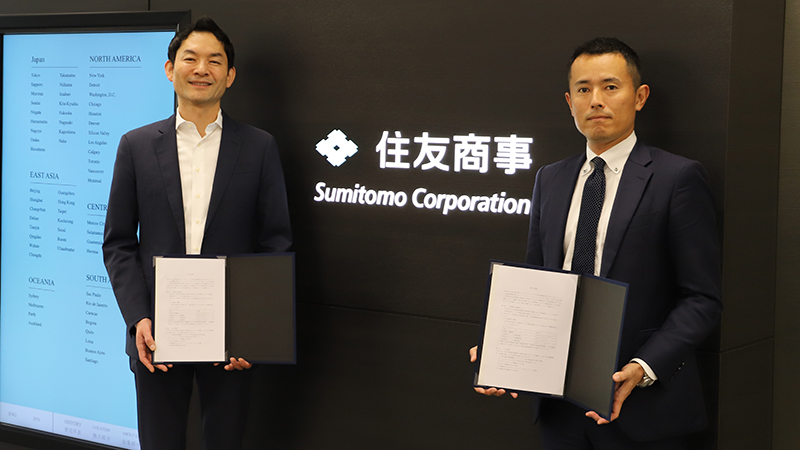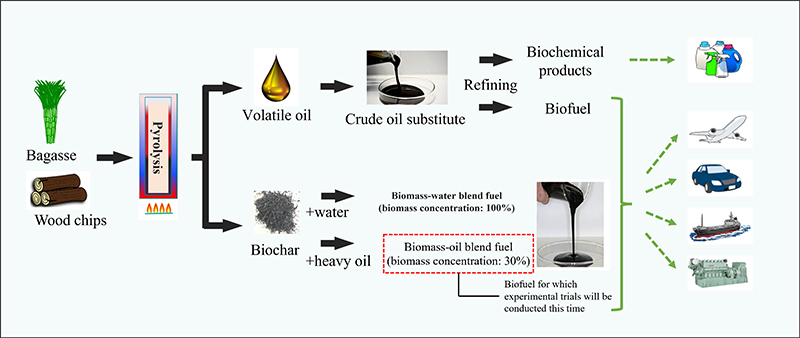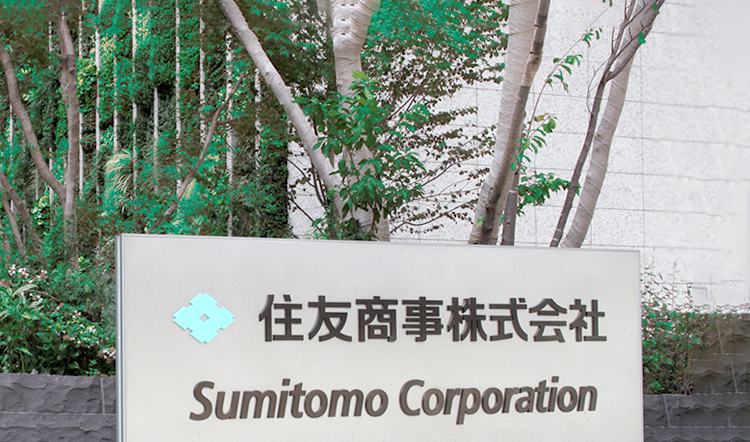Jan. 11, 2024
Starting Experimental Trial for Manufacture of New Biofuel and Biochemical Products through
Effective Use of Sugarcane and Wooden Biomass
On December 7, 2023, Sumitomo Corporation concluded a basic agreement with Solariant Capital LLC (“Solariant”) on the manufacture of a new biofuel and the establishment of a supply chain for the fuel. Accordingly, Sumitomo Corporation will launch Japan’s first experimental trial to run a diesel engine using biofuel produced from bagasse (*1) and wood chips.
| *1 | Residue left after juice is extracted from sugarcane at a sugarcane mill |

Solariant is a renewable energy development and investment company headquartered in the US state of California. Its Japanese arm also engages in biofuel trading. The biofuel newly developed by Solariant differs from conventional biofuel products derived from waste food oil in that it is a “biomass-heavy oil blend” that contains biochar produced from the pyrolysis of bagasse and wood chips at the rate of 30%. Going forward, the concentration of biomass (biochar) will be further increased to reach 100% to develop a “biomass-water blend” fuel.
Also, for the volatile oil that is produced alongside biochar in the pyrolysis process, experiments on using the oil as a crude oil substitute and possibly also as a biochemicals material will be carried out in collaboration with a domestic oil refining company and others.

Promoting the use of biomass to solve social issues
In the experimental trial, surplus bagasse that cannot be treated within a sugarcane mill and wood chips derived from forests will be used as raw materials for biofuel.
Global production of bagasse reaches around 100 million tons annually. Bagasse is utilized for the combustion of boilers at sugarcane mills, but due to higher boiler fuel efficiency and to an increase in bagasse production driven by the improvement of sugarcane varieties, the amount of surplus bagasse being discarded has been increasing year on year, becoming a social issue.
Japan, meanwhile, has around 25 million hectares of forests, accounting for 66% of the country’s total land area. Of this, roughly 10 million hectares are occupied by plantation forests. Many of these forests were created by planting trees during period between the end of World War II and the beginning of the high economic growth period, and half of them contain trees that are more than 50 years old and as such require felling. Such felling or other reforestation activities have not been conducted, however, leaving many wood resources unused.
By making effective use of these unused wood resources as well as surplus bagasse, Sumitomo Corporation aims to contribute to preventing environmental pollution caused by biomass waste and to creating a decarbonized society.
Future experimental trial projects and business development
Based on the agreement, Solariant will build an experimental facility in Tanegashima in Kagoshima Prefecture, which represents the northern limit for sugarcane production and the southern limit for the growth of Japanese cedar trees, in 2024. As for the raw materials for biofuel, bagasse will be supplied by Shinko Sugar Mill, which is an equity- method affiliate of Sumitomo Corporation, and wood chips will be supplied by the local forest association in Tanegashima. The biofuel produced at the facility will be delivered mainly to users of heavy oil via the Sumitomo Corporation Group. After the experimental stage is completed, Sumitomo Corporation and Solariant will build a commercial plant to manufacture and sell biofuel and biochemical products on a full scale in and after 2027.
For this project, the Sumitomo Corporation Group will draw on the experience it has accumulated in various fields as an integrated trading company, particularly its expertise and development experience in biochemical-related business. After commercialization, the Group will take charge of the marketing and trading of the biofuel and biochemical products.
Sumitomo Corporation will conduct a series of activities for the commercialization of the project as described above under the Program on Open Innovation Platforms for Industry-academia Co-creation (COI-NEXT) (*2) (in the “Co-creation area” with “Full-scale type” funding), which is led by the Japan Science and Technology Agency (JST). The activities will also be promoted under the theme of “Demonstration and implementation of GX technologies to enhance food production and ecosystem conservation,” which is led by Project Associate Professor Satoshi Ohara at Institute for Future Initiatives (IFI), The University of Tokyo, by the Research Center for “Co-JUNKAN” Platform towards Beyond “Zero-Carbon” under COI-NEXT program (*3) (Project leader: Associate Professor Yasunori Kikuchi at IFI). As a partner of this Research Center, Sumitomo Corporation will cooperate with the University, which represents the Research Center, as well as Solariant, Nippon Shokubai, Shinko Sugar Mill and other partners of the Center.
| *2 | Official website of the Program on Open Innovation Platforms for Industry-academia Co-creation (COI-NEXT) : coinext_pamphlet2022_en.pdf (jst.go.jp) |
| *3 | Official website of the Research Center for “Co-JUNKAN” Platform towards Beyond “Zero-Carbon” under COI-NEXT program : TOP | Research Center for “Co-JUNKAN” Platform towards Beyond “Zero-Carbon” under COI-NEXT program (u-tokyo.ac.jp) |



